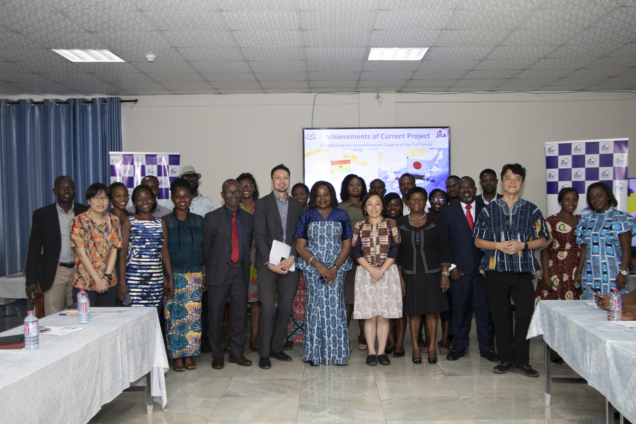Japan International Cooperation Agency (JICA) in collaboration with the Civil Service Training Centre (CSTC), has implemented a new Learning Management System (LMS) to help train civil servants using e-learning.
Speaking at a press conference on Thursday, February 29, JICA Expert, Masashi Yamanaka noted that this e-learning platform will help strengthen civil servants’ skills and capacity, adding that it is essential to improve education and training.
Explaining the concept of LMS, he stated that the platform uses a hybrid learning system where 70 per cent of the training is done online and 30 per cent is done in person.
This allows civil servants the opportunity to use laptops, phones and other technological devices to take the training classes when they cannot make a trip to the training centre.
“Our vision is to provide more opportunities for everyone to be trained. In Accra, you can still do training in person and places like Kumasi, they can do Zoom training. But there are a lot of regions with limited or no access to the internet. In that case, they can use the e-learning,” Mr Yamanaka explained.
“So this is not replacing all the training with e-learning, no. We are just increasing our options so that we can cover more population and get more opportunities for more people,” he added.
Additionally, JICA provided funding for purchasing professional quality video cameras, photocopiers, hybrid training rooms and studios, 16 laptop computers and other equipment to improve learning and training, Mr Yamanaka said.
Yearly, the Civil Service Training Centre (CSTC) trains about 5,000 lower and middle-level personnel in the civil and public service.
However, the COVID-19 pandemic affected the in-person tutoring in place, making classes move online, but with many challenges including poor internet connectivity.
JICA helped CSTC develop an e-learning platform and created e-learning courses to aid in implementing the centre’s new learning management systems.
The nearly two-year project that began in June 2022, aims not just to strengthen the human resource capacity of the civil service but also increase the number of trainees yearly which in turn improves the civil service.
JICA hopes that by the close of the project in March 2024, four e-learning courses namely ADIIB Analogous Grade Cohort-1, Cohort-2, Cohort-3, and Report Writing Skills Course will be completed.
A pilot run of the project has seen a favourable response from participants. The delivery of the courses will, however, commence soon.
Mr Yamanaka noted that there are also ongoing efforts to develop courses that implement kaizen, a Japanese term meaning change for the better or continuous improvement.
He believes that continuously and consistently developing people’s skills regardless of how small will ensure the growth of the civil service and in turn benefit the country.
“If you improve yourself by 1% every day continuously, it can have a great impact. Gradually, there will be accumulation of more growth, and you will become greater than today.”
“We believe that we can do the same thing here in Ghana. If we continue improving our field every day, then it will take us to the peak, that is how we can change the course of the country,” Mr Yamanaka added.
Meanwhile, CSTC is open to collaborating with any potential client to work on tailor-made courses for the institution.
Also speaking at the event, the Principal at the CSTC, Mrs Dora Dei-Tumi, said she is hopeful the institution will be able to expand its services and grow the number of civil servants trained every year.
She noted that it is important to train these civil servants to improve their skills and capacity and, in turn, offer good services to Ghanaians and use the training to push for their promotion.

